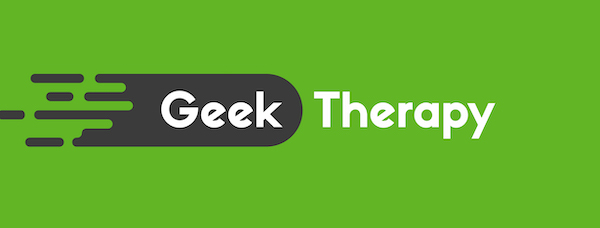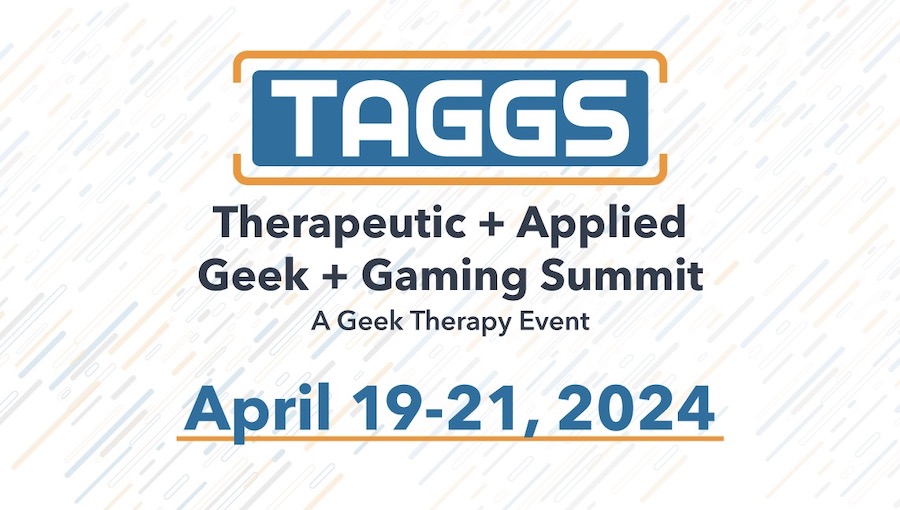The following is an interview with Ariel Landrum (LMFT, Clinical Director – Guidance Teletherapy Family Counseling Inc.) and Josué Cardona (founder – Geeky Therapy) regarding the upcoming virtual summit, TAGGS (Therapeutic + Applied Geek + Gaming Summit) hosted by the nonprofit organization, Geek Therapy. In this interview, Fanbase Press Editor-in-Chief Barbra Dillon chats with Landrum and Cardona about the multi-day celebration of visual and fine arts and therapeutic benefits, the various activities and programming which attendees can anticipate from the event, and more!
Barbra Dillon, Fanbase Press Editor-in-Chief: You will soon be launching the annual virtual summit, TAGGS this April. For those who may be unfamiliar, what was the inspiration for this multi-day celebration of the visual and fine arts and their therapeutic benefits?
Josué Cardona: At our nonprofit organization, Geek Therapy, we were planning an event that was a conference for helping professionals with presentations, workshops, and continuing education and combine it with a tabletop gaming convention with gaming all afternoon and night. We were in early planning stages and had looked at some locations in the Chicago area. Then out of nowhere my friend Jack Berkenstock Jr, who runs The Bodhana Group in Pennsylvania, reached out about something similar. The Bodhana Group already runs a local convention called Save Against Fear that focuses on the therapeutic use of tabletop role-playing games (TTRPGs), so we collaborated on a virtual event we called TAGGS that combined TTRPGs and other Geek culture staples and we were explicit that everyone who was interested in using Geek culture to help others was welcome. That was in 2021 and Geek Therapy now runs TAGGS every Spring while The Bodhana Group runs Save every Fall.
BD: What kinds of panel programming and other activities can attendees expect to enjoy with this year’s event?
Ariel Landrum: Oh, this year’s TAGGS is shaping up to be quite the adventure! We’re rolling out three distinct tracks that dive into the myriad ways geek culture intersects with therapeutic practices. First up, “Applied TTRPG” is all about merging the fantastical worlds of tabletop role-playing games, like Dungeons & Dragons, with therapy. Attendees are going to see how these games aren’t just for entertainment; they’re tools that can foster social skills, emotional resilience, and even therapeutic breakthroughs. We’ve got experts sharing their secrets on blending role-play with mental health interventions – it’s gonna be epic.
Then there’s “Media Matters.” This track is where pop culture meets psychology. We’re exploring how movies, TV shows, and video games influence therapy and our understanding of ourselves. It’s about using the stories we love – from “Zelda Breath of the Wild” to characters like Darth Vader, to even the shows of Grey’s Anatomy – as tools for empathy, advocacy, and engagement in therapeutic and educational settings. The idea is to enrich mental wellness through the narratives that captivate us.
And lastly, “Geek Out. Do Good.” This one’s close to my heart. It’s where our geek passions fuel social impact and wellness. Expect sessions on self-care, building inclusive communities, and geek-themed mental health strategies. Attendees will learn about appropriate representation and advocacy institutives. It’s perfect for anyone wanting to leverage their geek interests for advocacy, education, and creating supportive spaces in mental health.

BD: Ariel, how did you come to be involved with TAGGS, and what are you most looking forward to about this year’s event?
AL: Oh, my journey with TAGGS has been a bit of a whirlwind, honestly. Back in 2021, which feels like both yesterday and a lifetime ago, I took a chance and threw my hat in the ring with a couple of panel proposals. Honestly, this was the first time I had submitted a proposal for any panel for any convention or summit. I didn’t know what to fully expect but I figured even if it wasn’t chosen, it would be a learning experience. To my surprise, both my submissions were chosen, and both had huge attendance! The first one was on documenting geek and gaming interventions. Given my past life as an auditor, I’m weirdly enthusiastic about documentation, ensuring it’s done legally, ethically, and meeting the needs of various governing bodies. Plus, I knew that translating the magic of using fandoms in therapy into something clinical was a challenge some of my peers faced. I figured that would be a dud, but to my surprise lots of attendees appreciated getting hacks and tips on documentation.
Then, there was the Disney Princess evolution panel I did with my best friend and educator, Stefanie Bautista. We’re both major Disney enthusiasts, so getting the chance to talk about the princesses and their journeys was gonna feed my Disney-Adult heart. The panel was a hit, which honestly took me by surprise, and yet didn’t because plenty of people love Disney Princesses. Still, the success of that panel led to Josué asking Stefanie and me to take over the Happiest Pod on Earth for the Geek Therapy Network. Talk about an honor! Now, she and I meet regularly to talk about using Disney mediums in the therapeutic and educational setting.
Before all this, I was more of a casual participant in Geek Therapy’s world, tuning into events and catching episodes of Geek Therapy Radio. I admired the community’s blend of geek culture with mental health from afar. So, when my panels were selected, and I found myself diving deeper into this community, I was thrilled to see how supportive and caring the community was.
And now, here I am, not just a fan but a board member and heading up the education department. It’s wild to think about the journey from attendee to presenter to board member. It just goes to show how welcoming and inclusive the Geek Therapy community is.
As for this year’s TAGGS, it’s like looking forward to a major season finale. I’m excited to see how much we’ve grown, the new ideas we’ll explore, and the incredible people I’ll get to meet and learn from. The chance to be part of these conversations, to see the community come together over our shared love for geek culture and its impact on therapy, is just something I can’t wait to experience again.
BD: Would you advise that TAGGS is accessible for both mental health industry professionals and laypersons alike?
JC: Absolutely. I hope that message comes across because therapists don’t own the word “therapeutic” and there is so much that helping professionals can learn from the communities they serve, just like educators learn so much from their students. In addition to therapists we have attendees and presenters who are sharing their experience as patients, game designers, and educators. I really love it when students come and get a taste of what their career could look like, which is nothing like what they’ve been taught in school. As an organization, we’re maturing in the continuing education aspect, developing the “professional” part of TAGGS as a professional conference, but we hope it’s still fun and informative for everyone, whether they need continuing education credits or not. Every year we do things a little differently, so we’ve run games after the presentations, had networking events, and used Discord for communication during the event.
BD: Josué, what can you share with our readers about Geek Therapy, the organization behind this incredible yearly event?
JC: Over a decade ago I coined the term Geek Therapy to refer to the integration of Geek culture and psychotherapy. I developed a Geek Therapy model to teach people how to do that and I felt the best way to spread the word was through podcasts and building an online community. The organization is really focused on advocacy for the meaningful use of Geek culture in the helping professions and education (not just psychotherapy), teaching through resources and content, and fostering the GT community. We’re nearing 10k people in our Facebook group alone, and I think most of them don’t know that it started as a fan group for our podcasts, which I love because it means the community itself has become a welcoming and helpful resource. Thanks to members like Ariel, we’re growing and maturing as an organization. We’re all volunteers so I’m very proud of what we’ve accomplished and what we’re building.
BD: Lastly, what would you like to tell fans who want to learn more about TAGGS and Geeky Therapy?
JC: Video games, comic books, TTRPGs, sci-fi, fantasy, anime, plus therapy and education?! I never imagined that an event like TAGGS was possible and I’m so happy that now it exists for people to enjoy and learn from. We’ve made TAGGS a platform for people around the world to learn from each other about combining their favorite things with helping people, and I hope that if you’re reading this you’ll check it out. TAGGS is Geek Therapy’s biggest fundraiser, so we sell tickets that also provide continuing education for some professionals, but we make all presentations available for free one year after the event, so you can grab a pass to the TAGGS “vault” and access previous years’ presentations for free.
Visit us at geektherapy.org to learn more and remember to Geek out and do good!
You can also like and follow all our socials
Instagram: https://www.instagram.com/geektherapy/
X/Twitter: https://twitter.com/GeekTherapy
Facebook: https://www.facebook.com/GeekTherapy
Facebook Group: https://www.facebook.com/groups/1663320987305797
Discord: https://discord.com/invite/uStbMNc
YouTube: https://www.youtube.com/channel/UC078UaO2fd1jon9q5fHFgUg
TikTok: https://www.tiktok.com/@geektherapy
Threads: https://www.threads.net/@geektherapy
You can also check out our podcasts on the Geek Therapy Network:
GT Radio: https://podcasts.apple.com/us/podcast/gt-radio-the-geek-therapy-podcast/id546227507
Happiest Pod On Earth: https://podcasts.apple.com/us/podcast/the-happiest-pod-on-earth/id1464612816

